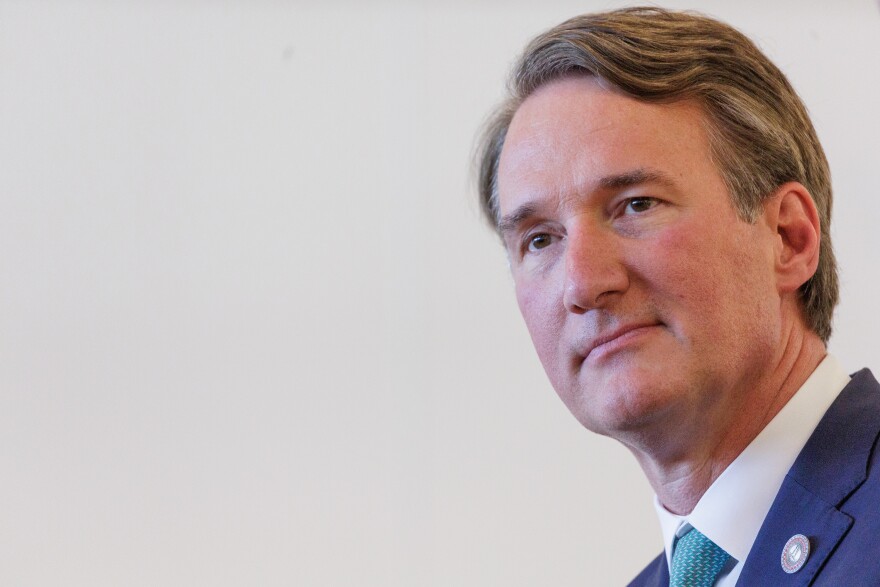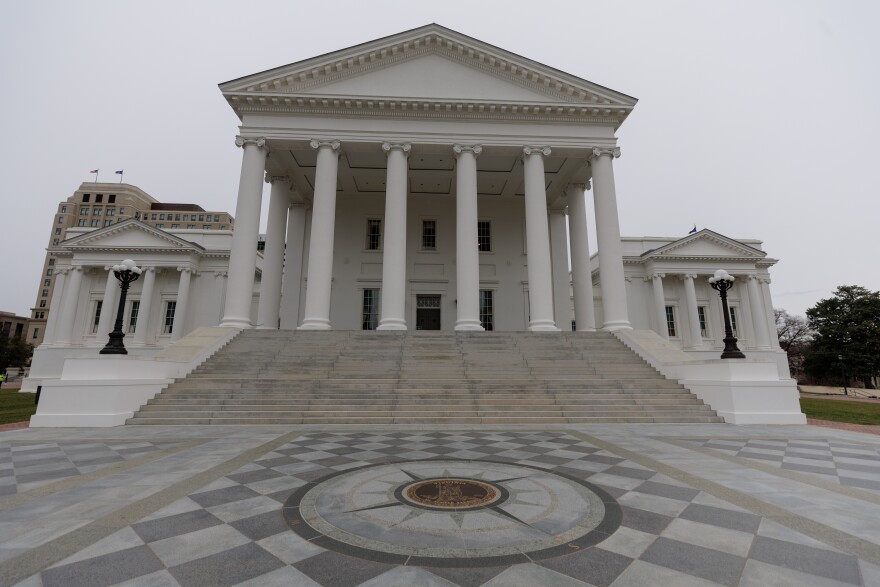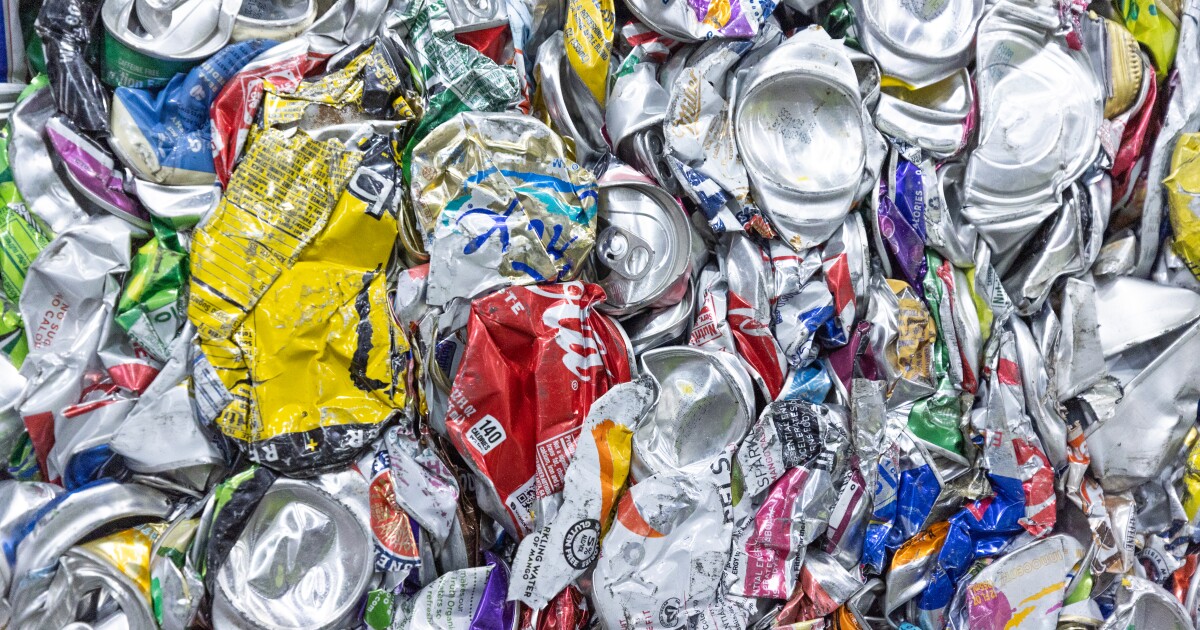State data shows a steady decline in Virginia's recycling rate between 2021 and 2024, and a new report from the state Department of General Services highlights some difficulties Virginia agencies face in implementing recycling programs.
The report was a result of Gov. Glenn Youngkin's Executive Order 17, a 2022 effort to divert more of the commonwealth's waste from landfills. The order also called for new advanced recycling facilities, renewed recycling programs and the use of post-consumer recycled products.
Despite these goals, state data shows that recycling rates in the commonwealth have declined slightly since Youngkin took office. And the number of core recycling facilities in Virginia fell about 13% from 2012 to 2022, according to U.S. Census Bureau data; Data for the following two years were not immediately available.
Who pays?
Zach Huntington, marine debris strategy director for Clean Virginia Waterways, said there are barriers throughout the waste system that hinder the reduction of landfill waste and trash in Virginia. One of these obstacles is money.
“The Litter Control and Recycling Fund is extremely successful despite generating the lowest per capita revenue of any state using a similar system,” Huntington said.
Administered by the state Department of Environmental Quality, the fund is funded through taxes on commonly discarded products and distributes money to municipalities to implement various recycling programs. A CVW report last year called for a closer look at funding sources that have not kept pace with recycling cost inflation. A budget amendment to study the issue failed in committee earlier this year.
Access is also an issue: Not all municipalities have recycling programs and not all recycling programs offer pickup. Apartment dwellers may struggle with not having enough space for trash cans or not having recycle bins at all. And all recycling providers have to be selective about what they take; Some things like electronics cost a lot to process and most plastics are difficult to process and sell.
Huntington said the state could make policy changes to raise more funding and reduce the amount of waste in the first place.
“This must be accompanied by the recognition that it is impossible to solve the problem of plastic pollution through recycling,” said Huntington.

Shaban Athuman
/
VPM news
That could mean pursuing extended producer responsibility laws, requiring plastic waste producers to pay for recycling programs. Huntington said data from a 2022 poll conducted by CVW shows voters are receptive to the idea: 71% of respondents agreed that some costs should be shifted to producers.
Lawmakers and Youngkin have previously tried to bring “advanced recycling” facilities to Virginia. This is an umbrella term for systems that use chemical processes to break down certain materials – especially plastics that cannot be processed in typical recycling plants – into raw materials for new products.
Advanced recycling facilities have been criticized for their impact on the environment: They burn fossil fuels, use chemicals and can only process certain materials. Others are landfilled or used as raw material for petroleum fuels.
One such facility planned for Cumberland County received $200,000 in state funding before being shut down by operator Braven Environmental in 2022.
“Virginia urgently needs to invest in recycling, but they need to invest in real recycling opportunities – aluminum and glass and legitimate reuse or downcycling of plastic – whether it's made into buckets or composite decking and benches, but not fossil fuels or fossil fuels “Additives,” said Huntington.
There are some facilities in Virginia that “downcycle” plastics into other products, such as Winchester-based Trex, which makes decking and other outdoor building materials from used plastic and wood.
State agency recycling programs
State agencies surveyed in the DGS report faced challenges such as lack of funding or staffing, lack of access to recycling programs or providers, and knowledge gaps regarding best practices or benefits.
“As an agency, the desire is to recycle as much as possible. Most of our park locations are in rural communities and recycling options vary widely. These range from no recycling available to locations that offer many options,” one agency wrote.
Youngkin's executive order also required the Department of General Services to measure the total weight of recycled materials.
Eleven agencies provided data on their recycling tonnage, up from 14 last year. They said they recycled 104 tons, compared to 698 in the 2023 report.
The decline could be due to a variety of reasons: inaccuracies in reporting, fewer reporting points, or an actual decline in recycling.
The report made four recommendations:
- Implement recycling plans when onboarding your employees
- Appoint a “recycling point person”
- Use the DEQ instructions
- Standardize recycling weight measurements.
Three-quarters of responding agencies said they have a recycling plan in place to raise awareness and capture recyclables. However, the data is limited: 47 of 101 agencies, including public universities, responded to the 2024 survey questions. That's down from 62 responses in the 2023 report.

Shaban Athuman
/
VPM news
What will the General Assembly do?
Waste management will be addressed in the upcoming session of the General Assembly – at least in the budget discussions. Youngkin again proposed delaying the start of a phased ban on polystyrene takeout containers in his December budget proposal.
This measure has gone back and forth. Originally passed in 2021, large restaurant chains would have had to stop using non-recyclable material by 2023 and all other restaurants by 2025. The following year, Youngkin and the GA pushed this back to 2028 and 2030, before moving it again this year to non-recyclable material in 2025 and 2028, respectively.
The Youngkin government did not respond to a request for comment on the recycling reports.
The governor's latest budget amendment pushes the ban to 2028 for large restaurants and 2030 for all others – citing the costs of the shift for small restaurants.
Alternative measures — including a so-called “bottle bill,” an expanded producer responsibility measure — discussed by Huntington and others did not gain enough support in the Capitol to consider tabling legislation.
“Sourcing local recycled materials reduces our dependence on foreign material, gives us more control over quality, avoids becoming a dumping ground for unfair trade and can avoid future tariffs,” said Rick Galliher, founder of the VA Bottle Bill Organization, in an email. “If we keep the money here in Virginia, the state’s economy will grow. Now we buy glass from the New England states to use here.”
Galliher said bottle bills have only succeeded with the support of manufacturers, which he is now trying to enlist.
States with bottle bills are generally better at recycling beverage containers than the rest of the country. For example, compare Virginia's 8% rate for recycling PET bottles (a traditionally recyclable plastic) to 75% in Maine or 71% in Oregon.
